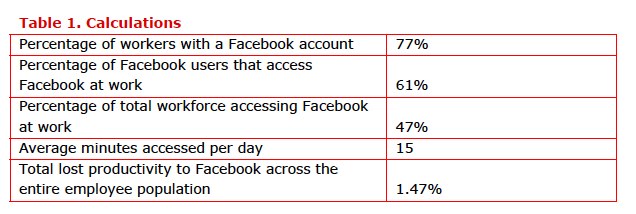Facebook at work: 'Social Notworking'?

I see you out there during the day - posting Facebook photos, writing on your friends' walls, uploading lists of 25 things I really don't care to know about you. But hey, aren't you supposed to be working during the day?
A report issued today by Nucleus Research found that nearly half of office employees access Facebook during work and that companies are losing an average of 1.5 percent of total office productivity because of it. (Report PDF)
But only 13 percent of those folks are actually using Facebook during work hours to conduct work business. In fact, 87 percent of the survey's respondents couldn't define a business reason for using it. Better yet, six percent said they only access Facebook from the office.
Should companies be concerned? The research isn't suggesting that companies pull the plug on Facebook usage at the office but did warn that they should watch out for red flags, such as lost productivity, and should consider being a bit big brother about it.
Need another reason? Consider this excerpt from the report:
Beyond its impact on productivity, Nucleus also noted the growing use of Facebook as an alternative e-mail platform. Although not necessarily bad, Facebook isn’t monitored and managed by an organization like e-mail is. Savvy younger users recognize that traditional e-mail and even personal accounts like gmail can be monitored by corporate IT, while Facebook messages aren’t. For organizations that have invested in security software to secure sensitive information and limit their transmission via e-mail, Facebook can help users circumvent those controls, opening up the potential to violate corporate communication policies.
That's something to think about.
